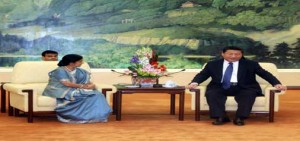BEIJING, Feb 2:

Russia, India and China today made a united pitch for bringing to justice “perpetrators and sponsors” of terror acts as they sought an early conclusion of the India-moved resolution to combat international terrorism.
Foreign Ministers of the three countries also agreed to enhance trilateral cooperation, including regional connectivity, during the 13th Russia-India-China (RIC) meeting here.
External Affairs Minister Sushma Swaraj represented India at the trilateral that was also attended by her Chinese and Russian counterparts Wang Yi and Sergey Lavrov respectively.
The three countries also called for early conclusion of Comprehensive Convention on International Terrorism (CCIT), a resolution moved by India to address gaps in the international legal framework against terrorism.
India circulated the draft CCIT at the UN General Assembly (UNGA) in 1996. The objective of the CCIT is to strengthen cooperation to combat international terrorism.
“Russia-India-China Foreign Ministers agree to enhance trilateral cooperation,” Ministry of External Affairs spokesperson Syed Akbaruddin tweeted.
“Russia-India-China call to bring to justice perpetrators, organisers, financiers and sponsors of terrorist acts,” he said in another tweet.
China and Russia also voiced their support to India joining the Shanghai Cooperation Organisation (SCO) after completing all necessary processes.
“China-Russia support India joining SCO after completing all necessary processes,” Akbaruddin said.
The SCO, a six-member Eurasian political, economic and military grouping, was founded in 2001 in Shanghai by the leaders of China, Kazakhstan, Kyrgyzstan, Russia, Tajikistan, and Uzbekistan.
India currently holds an observer’s status in the bloc.
The countries also welcomed India’s participation in the Asia-Pacific Economic Cooperation (APEC).
“Russia-India-China Foreign Ministers acknowledge India’s importance in growth & welcomes Indian participation in APEC,” said Akbaruddin, who is accompanying Swaraj during her four-day maiden visit to the communist nation.
The APEC is a forum for 21 Pacific RIM member economies that seeks to promote free trade and economic cooperation throughout the Asia-Pacific region.
The RIC meeting was earlier scheduled to take place in August last year but Swaraj cancelled her travel which was to take place just ahead of Prime Minister Narendra Modi’s visit to Japan.
Meanwhile, Chinese President Xi Jinping today met External Affairs Minister Sushma Swaraj here and said China and India have taken “solid steps” to make new progress in bilateral ties besides implementing the agreements reached between him and Prime Minister Narendra Modi.
“I have full confidence in India-China relations and I believe that new progress will be achieved in growing this bilateral relationship in this new year,” Xi told Swaraj, who called on him at the cavernous Great Hall of the People here on her maiden visit to the Communist nation after she assumed charge last year.
Xi said that since his visit to India in September last year, relations between the two countries have entered into a new stage of growth.
“The positive side of India-China relations has been growing and momentum of our cooperation has been strengthening and solid steps are being taken to implement agreements reached between Prime Minister Modi and I,” he said as he welcomed the 62-year-old senior BJP leader.
One such solid step taken was yesterday’s exchange of notes on modalities for opening the second route for the Kailash-Manasarovar Yatra in Tibet via Sikkim by June, that will allow more Indians to undertake the pilgrimage.
Xi had promised opening the new route to Modi during the former’s maiden visit to New Delhi last year.
Recalling fond memories of his India visit, Xi told Swaraj: “Last September I visited India and cherish fresh memories about the gracious hospitality extended to me by Government and people of India.
“In particular, I cherish the memories of Prime Minister Modi’s home province Gujarat and Prime Minister himself accompanied me on that trip.”
The 61-year-old Chinese President, who is also the General Secretary of the ruling Communist Party, conveyed his best wishes to the Indian leadership.
“Please convey my best regards and greetings to President (Pranab) Mukherjee and Prime Minister Modi when you go back,” Xi said in a rare meeting with a visiting Foreign Minister.
Reciprocating Xi’s warm words, Swaraj said Prime Minister Modi has sent his greetings and best wishes for the Chinese Lunar Year of Sheep, which commences on February 19.
“Prime Minister Modi has extended his very best greetings for the Chinese Lunar Year of Sheep, which I have been told is associated with creativity and innovation… Your visit to India was also associated with creativity and innovation based on which the two countries explored new ways forward.
“Your September visit has special importance for people of India, particularly for me because our first meeting took place during that trip,” she said, adding that new ways were being devised to improve ties between the two countries.
Swaraj, who is on a four-day visit here, held marathon talks with her Chinese counterpart Wang Yi yesterday on key issues and emphasised that maintenance of peace and tranquillity at the border was a pre-requisite for the development of ties.
It was also announced that Prime Minister Modi will embark on an “outcome-driven” maiden visit to China before May 26, when his party completes one year in office.
Modi has had three successful meetings with Xi, the most important being during the latter’s visit to India in September last year.
Xi is expected to take him to Xian, capital of his home province Shaanxi, to recreate the bonhomie generated by Modi who had taken the Chinese President to Ahmedabad, the capital of his home State Gujarat. (PTI)

